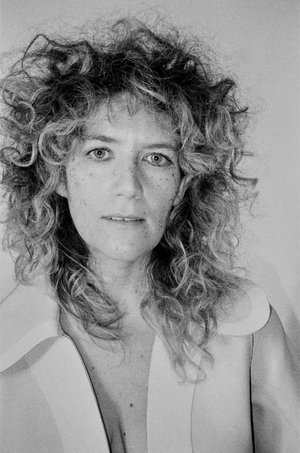No Joy's New EP 'Can My Daughter See Me From Heaven' Out Today
Can My Daughter See Me From Heaven is out today via Joyful Noise and via Handrawn Dracula in Canada.

Today, No Joy, the genre-defying project of Jasamine White-Gluz, is releasing their new EP, Can My Daughter See Me From Heaven. The EP features orchestral reimaginings of 4 songs from No Joy's critically acclaimed 2020 album Motherhood and a cover of Deftones' "Teenager."
A close listen to the 5 songs that comprise Can My Daughter See Me From Heaven will reveal the absurdist influences behind the EP: Disney's 1986 DTV Valentine special, which set tracks like Eurythmics' "There Must Be An Angel" to classic animation, live reimaginations of '90s alt-favorites like Bjork performing "Isobel" with a live orchestra, and inventive instrument expressions of the same era, like steel drums and acoustic guitars on Jane's Addiction's "Jane Says." "Some of those late 90s electronica trip-hop acts involved strings in their live performance. I was interested in that, and with some of them, I was like, 'Let's go full Little Mermaid," White-Gluz says.
To commemorate the release White-Gluz chatted with the multi-instrumentalist Ouri (of Hildegard), who plays on the EP, for Talkhouse. She also put together a playlist of influences for Brooklyn Vegan, and penned a track by track breakdown of the EP for FLOOD.
Can My Daughter See Me From Heaven is out today via Joyful Noise and via Handrawn Dracula in Canada.
On 2020's Motherhood, Jasamine White-Gluz's first full-length as a soloist and No Joy's first album in five years, her guitar returned for a genre-agnostic, maximalist treatise on aging. Fertility, family, death, birth, her voice heard loud in the mix, White-Gluz became a commanding force among the many-splendored sounds of trip-hop, trance, nu-metal, dance rock, and, of course, shoegaze, delivered through banjo, vibraphone, scrap metal, slap bass, even kitchen appliances. Who knew chaos could have such lucidity?
Now, White-Gluz's ever-expansive evolution has brought forth Can My Daughter See Me From Heaven, an EP reanimation of five songs from Motherhood, transformed by new orchestral instrumentalists: an opera singer, a cellist, a harpist, French horn musician. These songs, recorded entirely remotely, are not a correction. They are a spring rebirth-an opportunity to grow those tracks, similar to the transformation they would've undergone live, on stage. "Songs take on a new life when I'm on tour. These songs didn't get that chance. I still had more to say with them," White-Gluz explains. "I probably never would've been like 'let's get a bunch of classically trained players together,' if it wasn't for covid-19 [canceling tours. This EP] was an opportunity to do something that wasn't obvious. It's a bedroom recording, but it doesn't sound like we recorded this in our bedrooms. I wanted to do something that sounded bigger than Motherhood did, and Motherhood was recorded before covid." Where many musicians used last year's disaster to look inward, releasing solitary, insular albums, No Joy did the opposite: "It was more, 'Let's try everything!' Give me something to look at!"
And there is much to look at. The songs of Can My Daughter See Me From Heaven are bigger-but they're brighter, too, an ascension from the physical thrash of the terrestrial Motherhood. Ugly, angelic arrangements are the reason, and No Joy's collaborators old and new are the cause: co-producer and guitarist Tara McLeod (Kittie) from Toronto returned, as did Jorge Elbrecht (Sky Ferreira, Japanese Breakfast, Wild Nothing) and Heba Kadry (Björk, Slowdive, Ryuichi Sakamoto) for mixing and mastering, respectively. New additions include Toronto's Sarah Tawer, a virtuosic drummer who can cover any genre, Nailah Hunter, experimental harpist from Los Angeles, Montreal's Ouri, a performance artist and cellist, and Calgary's Brandi Sidoryk, a master of the French horn and a classically trained opera singer who performed backup to White-Gluz-a No Joy first, but not the only one. "I don't even play guitar on this record," White-Gluz adds. "That's never happened before."
It is unusual, then, that a band called No Joy found inspiration for their latest release in the joys of childhood, on an EP that tackles maternity and bodily limitation, but since when has No Joy been interested in predictability? Can My Daughter See Me From Heaven is an eccentric dream-a visionary concept, delivered with the beauty of an orchestra, punctuated with post-metal. It is alive.
Photo Credit: Jodi Heartz & Alex Blouin
Comments
Videos

